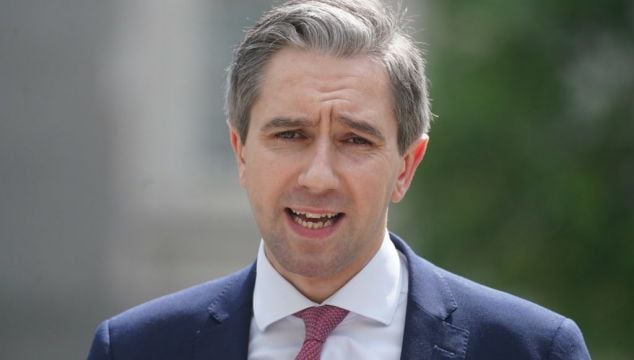Simon Harris looks all but certain to be named as our next taoiseach as most of the senior Fine Gael figures who could have challenged him have decided not to run, and backed him to succeed Leo Varadkar.
On Thursday evening, Mr Harris confirmed he would bid to become the next party leader.
Here, we have a look at the man likely to be the next leader of Fine Gael and the country.
Life and family
As a young boy growing up in the seaside town of Greystones, Co Wicklow, Mr Harris is said to have repeatedly stated he wanted to be taoiseach.
After cutting his political teeth as an assistant to former justice minister Frances Fitzgerald when she was a senator, and then working as a councillor, he was elected to the Dáil as its youngest TD in 2011.
His maiden speech in the Dáil was to nominate Enda Kenny as taoiseach.
He served as a junior minister in the Department of Finance from 2014 before being propelled to the role of Minister for Health in the Fine Gael-led minority government that was formed in 2016.
Mr Harris is married to nurse Caoimhe Wade, and the couple have two children.
Minister for Health
Mr Harris was named Minister for Health in 2016, and faced a lot of difficulties in the role, like many of his predecessors.
Issues included ownership of the National Maternity Hospital, the spiralling cost of the National Children’s Hospital and the cervical cancer screening controversy.
He was seen as one of the key voices in the Yes campaign for the abortion referendum in 2018, which saw the country vote overwhelmingly in favour of removing the Eighth Amendment from the Constitution.
In the February 2020 general election, Mr Harris was returned on the 15th count and remained as Health Minister.
The Government's early handling of the Covid-19 pandemic was seen as steady and effective, and Mr Harris played a big role in this.
He also came under heavy criticism for the dire situation in nursing homes during the early stages of the pandemic.
After incorrectly stating during a radio interview that Covid-19 meant there were 18 other coronaviruses, he did an Instagram live video where he showed humility by apologising and stating he was an “awful old idiot at times”.
In the 2022 Cabinet reshuffle, Mr Harris was appointed to the new Department of Further and Higher Education, Research, Innovation and Science.
As Minister for Higher Education, he was in a lower profile sector, but continued to be a key voice for Fine Gael on TV and radio.
He also became acting Minister for Justice during Helen McEntee's maternity leave.
Is he certain to be the next Fine Gael leader?
In short, the answer seems to be yes.
Minister for Social Protection Heather Humphreys and Minister for Public Expenditure Paschal Donohoe ruled themselves out of the running on Thursday, meaning all of his possible opponents have removed themselves from the race.
Mr Donohoe was previously seen as the main rival to Mr Harris.
Mr Varadkar said the new leader would be appointed by the time of the Fine Gael Ard Fheis on April 6th, and it appears there will be no competition for Mr Harris.
It will then be a matter of a Dáil vote, probably on Tuesday, April 9th, where a simple majority will be needed for Mr Harris to be named taoiseach.
Providing there is no Coalition rebellion, this is all but a certainty.
Strengths
Mr Harris' quick ascent to be the frontrunner shows his position in Fine Gael is solid.
He's seen as an effective communicator, and was one of the first Irish politicians to really embrace Instagram and TikTok, where he has a big following.
Despite calls from the opposition for a general election after Mr Varadkar's resignation, Tánaiste Micheál Martin and Green Party leader Eamon Ryan have insisted the Government will fulfil its mandate, so he has the support of his Coalition colleagues.
At 37, Mr Harris is set to become Ireland's youngest ever taoiseach (Mr Varadkar was 38 when he was elected).
This means he has plenty of time on his side, whatever the future holds, including a potential period in opposition for Fine Gael.
Having held the health and justice portfolios, Mr Harris will also be coming into leadership with experience of two of the most difficult briefs in politics.
Weaknesses
Detractors will point to the controversies during his time as Minister for Health, but in reality that's a position that most politicians have more losses than wins in.
He is also coming into power at a very difficult period for Fine Gael. After the overwhelming no vote in the recent family and care referendums, they are expected to endure difficult local and European elections on June 7th.
Indeed, some rumours have suggested this is why Mr Varadkar chose now to announce his resignation.
However, Mr Harris has just over two months to prepare for that, so even a mediocre result could be painted as a win for the party.
How long is he likely to be taoiseach?
The next general election has to be called by March 2025, and it is likely the Coalition will try to hang on until then, so Mr Harris could have just under a year in office.
However, being Ireland's youngest taoiseach will be a career-high, and he will have designs on holding that office again.
Fine Gael could well be set for a spell in opposition, but that could be somewhere for Mr Harris to build again after the exodus of TDs that is already confirmed for the next general election.
In an interview with BreakingNews.ie in January, former Fine Gael minister Ivan Yates said a period in opposition, with Mr Harris at the helm, could be an opportunity for the party.
"I think that there is no betting that Simon Harris will be the next leader of Fine Gael. I think he would rather take on the party in opposition with Sinn Féin in government. He would see it as fertile ground for the party to grow its identity, its brand and its base in the middle class, self-employed, and business communities, to get a solid party of 40 to 50 seats going forward." - Additional reporting from Press Association







